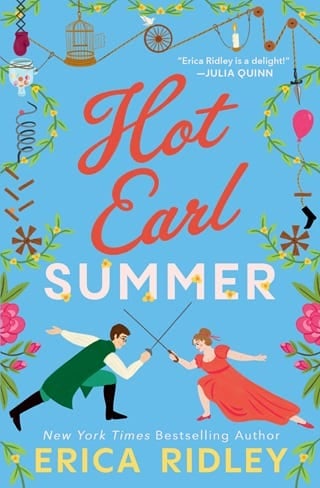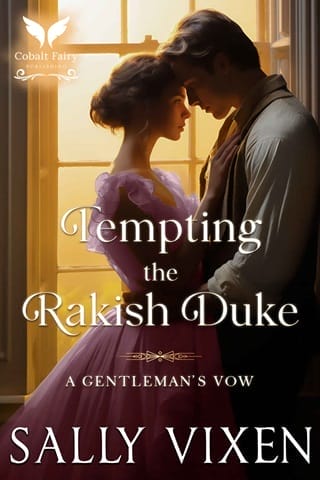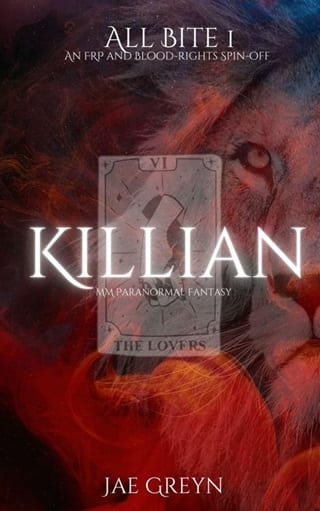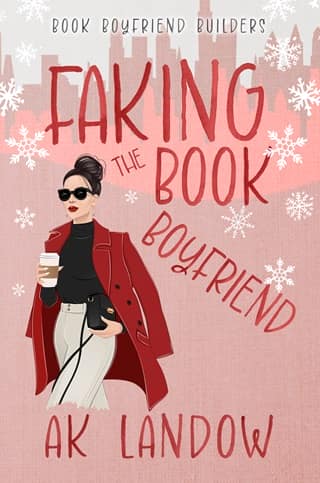25
T he tea was better than Elizabeth had dared to hope. The water supply indeed lasted all night, then all of the following day and subsequent morning. By then, she was able to collect the pile of hawk-delivered missives that had accumulated on the floor inside her window.
Her brother Graham had tracked down three different associates of the missing earl on the coast of France and was close to finding Densmore himself.
When Elizabeth rose to forty percent, she rang for food. When she reached forty-five percent, she cleaned herself up in the basin. When she reached fifty percent, she could have made tea and biscuits on her own. When she reached fifty-five percent, she brushed her hair and dressed in clean clothing.
When she reached sixty percent… it was time to face the world.
And Stephen.
She selected her sturdiest cane and made her way out of her bedchamber in search of him. Her heart pounded. Stephen wasn't in the dining room, and he wasn't in the earl's study. He was in the Great Hall, tinkering with one of his machines.
He looked as handsome as ever. That much hadn't changed. The casual deshabille of shirtsleeves, the molded-to-his-muscular-thighs pantaloons, the ridiculous leather helmet with its monocle and miniature telescope.
He must have heard her approach. His head swung toward the open doorway, and then he jerked himself upright. He yanked the hat from his head, pressing it against his chest with one hand while the other fingers raked through his brown, helmet-matted hair.
"Elizabeth," he said hoarsely. "Come in."
She stayed where she was. "Good afternoon."
"It isn't a good afternoon. It's a terrible afternoon. At least, it was, until I looked up and saw you. Now it's a great afternoon. Or it would be, if I didn't feel terrible. Let me start over." He flung the hat aside and strode up to her, his gray eyes soulful. "I'm sorry. That's what I meant to say. I'm sorry I wasn't what you needed."
This was it. Her chance to tell the truth.
"You could have easily been what I needed," she said quietly. "All I asked of you was to respect my privacy."
"I know." He raked his hand through his hair again. "You did tell me. Clearly and repeatedly. You're right. I just wanted to do more. Be more. I wanted to help."
"I know how bad it looked. How dreadful I looked."
"What are you talking about?" He rubbed at his face, which bore the markings of his telescope. "You didn't turn into a werewolf. Nothing I've seen has made you less desirable to me."
"I wish I could say the same," she said softly. " You turned into a werewolf. You clawed your way through and started pawing at me."
"I thought you were hurt!"
" You were hurting me."
"I stopped as soon as you said so. Almost as soon." He looked stricken. "If you'd warned me earlier…"
"It's my body. It's up to me what I share with others."
"That's true. And this is my body. It can't read minds. If there's something you want me to know, or a way that you want me to act… You're going to have to tell me so. Out loud. With words."
Stephen… was right. Elizabeth couldn't expect him to intuit what she needed from thin air. He couldn't think her thoughts or feel her pain levels, much less guess her preferences or emotional state.
It wasn't just a matter of communicating competently. She had learned young that her best advocate—for years, her only advocate—was herself. She'd explained her wishes to her adoptive family two decades ago. So long past that she'd forgotten her siblings hadn't materialized already knowing what she needed. Especially since Elizabeth had done such a good job of keeping everyone else at arm's length.
If she was going to let Stephen in—if she was going to expect him to act as though he knew her as well as her siblings did—then she would have to lower her shields and expose who she truly was.
"All right. Here are some words." She leaned on her cane. "If you feel you absolutely must intervene, please ask for permission before you meddle where you're not wanted. Then fully and immediately respect the answer. If the reply is ‘stay away' or ‘stop asking'… then you must stay away and stop asking . It's not ‘help' if it goes against the person's direct wishes. And for the love of God, please don't attempt to ‘fix' someone without an explicit invitation."
"I wasn't trying to fix you… exactly. I was fussing because… I wanted to show you I was on your side. That I cared. That I was fighting alongside you."
"You have to be invited to fight at someone's side. Teams aren't teams because one person decides something is wrong with the other person."
He let out a long breath. "You're right. Teams become a cohesive unit when they choose each other and decide what and how to fight together."
"Yes." She bit her lip. "Do you remember when I said I was fifty-five percent Elizabeth?"
"I remember." The corner of his mouth quirked. "I still cannot fathom how much more Elizabeth you could become."
"Today, I'm at sixty percent. Yesterday, a high in the forties. The night before that, after the duel… Essentially nothing. By the time I crawled into my bedchamber, there was no Elizabeth left. Zero percent remaining." She tried to smile and couldn't. "Bean abhorred my percentages."
Stephen's eyebrows lifted. "He did? Why?"
"He said I was always ‘optimal Elizabeth' because I was always me. Never lesser than anything or anyone." She swallowed. "When he first found me, I judged myself a zero, no matter what my body was currently doing."
Stephen looked outraged.
"The swords were my way of proving to Bean that I was as valuable and strong as any warrior. That I was of worth, every single day. One hundred percent. Bean said the swords didn't matter. He accepted all parts of me, just as they were. All he wanted was to nurture me to grow into myself." Her voice cracked. "I had never experienced anything like it."
"Your birth family was less understanding?"
"They couldn't find any visible injuries. So they didn't believe I was in pain, and they punished me for lying." New pain meted on top of existing pain… How she had tried to block out those memories. "Eventually, they did believe me."
"Did that make them accept you more… or less?"
"They didn't want me at all. If I couldn't perform the tasks assigned, then I became an unnecessary mouth to feed. They told me I was weak, and worthless. They sent me to live with my grandparents, who sent me to live with an aunt and uncle I did not know, who traded me to a merchant and his wife in exchange for an old dog cart. To them, the cart was the better investment. At least it was useful."
He winced.
"None of my relatives ever came back around to check on me. One day, when I felt an astonishing seventy-five percent, I ran away from the merchant. I doubted anyone would come for me. Who would pick up rubbish from the side of the road?"
"How far did you go?"
"All the way to London. I walked twenty miles in two days. On the edge of the main thoroughfare. No one came looking. By the time I reached Islington, I could barely crawl. I collapsed not far from Baron Vanderbean's new home, though I didn't know it at the time. He was driving past and stopped his coach and asked me if I needed a place to spend the night."
"So you climbed into his carriage?"
"I thought it over. He was a stranger, but even at ten years old, I had been bouncing from stranger to stranger for years. I wasn't afraid of new faces. Or corporal punishment. I had run away once, and knew I could do it again. But one thing convinced me above all others."
"The fact that this particular adult had bothered to ask a child what she wanted?"
"That he wasn't alone," she said softly. "There were five other children in that coach. Happy ones, with smiling faces. Waiting patiently, maybe even a little anxiously, to see if I would be willing to join them. Not judging me as lacking. The opposite. Fearful of being rejected themselves. So, yes. I got in. They helped me up that day, and every day after. We help each other up, just by being there. By letting each other have their power."
"I do think you're powerful."
"It didn't feel like it yesterday."
"That was a poor reflection of me, not of you." He sighed. "You accused me of treating you like a tinker with a faulty machine, rather than as one friend to another. Maybe you're right. But it was not because I thought you weak or useless. In my machines, every element is important. No matter how small or stiff or silly or abrasive. Every bit is an integral, irreplaceable part of the whole. So is everything about you."
"You're saying you still think of me as a broken machine?"
"No! I'm saying the sharp, prickly thorns of a rose don't outweigh the soft, delicate petals. They both make up one thing of beauty. You are the most gorgeous, fascinating, perfect equation I've ever had the fortune to try and decipher. You need all your pieces and variables in order to add up to Elizabeth."
"I can see the charm of Beth the Berserker's thorns. But what about the days when…" She held up her cane.
He took her free hand in both of his. "Elizabeth, I don't like you in spite of any given characteristic. I like all of you because it's who you are."
She cocked her head and held her silence.
"I more than like you," he said in a rush. "I am an utter fool for you. I like you so much that it shuts down my logic and makes me react with emotion, which is not a thing I believed myself capable of, until you battle-axed your way inside the castle."
She made a self-deprecating smile. "I'd do it again."
His expression was earnest. "For you, my door is always open."
She bit her lip. "I apologize, too. When it comes to how others view my disability, I've learned to fear the worst. I lash out when I'm angry or scared or in pain. Or embarrassed. And yesterday I was all those things at once. I accused you of overreacting, but the truth is, so did I. You're right that I cannot expect you to guess what I'm thinking. I purposefully did not communicate the full truth, and then blamed you for not reacting appropriately."
"We can both communicate better." His eyes beseeched hers. "I want to prove to you that I can be a safe place, that I respect you more than any other person I know. And then, I will ask you where, if anywhere, you'd like to go from there. Please let me spend the days we have left showing you how it could be, going forward."
"I am not much of a prize," she warned him.
"Because of your disability? I told you—"
"No, not that. I'm not a prize because I'm a prickly, off-putting berserker. You now know that my base personality is to attack first with claws, teeth, and swords, and apologize for the carnage later."
"I'm not afraid of your sharp edges. As it happens, I appear to have a fondness for prickly, off-putting berserkers," he assured her. "One in particular, anyway. You're not the only one willing to battle for what you want."
"All right, then." She took a deep breath. "I know I'm not easy to get close to. But if you really want to fight this war, then go ahead. Try your best to win."
 Fullepub
Fullepub 



